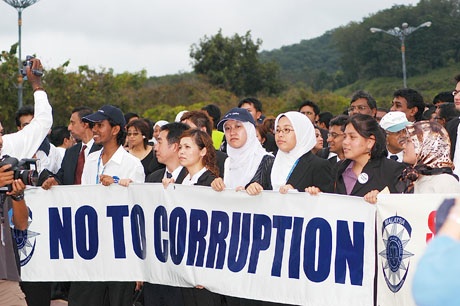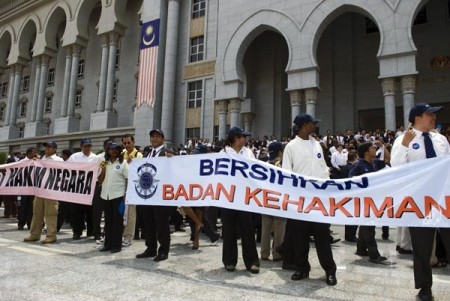This is the text of a talk given by Tommy Thomas at the 3rd Asia Pacific Regional Forum Conference of the International Bar Association, delivered on Monday, 26th November 2012 at 1.00 p.m. at the Shangri-La Hotel, Kuala Lumpur.
Mr Chairman, Ladies & Gentlemen,
I thank the Organising Committee of this IBA Conference for bestowing me with the honour of sharing my thoughts on the nobility of the legal profession, although they may regret extending the invitation after hearing my speech.
A review of your programme will give a clue to the staple diet of the international commercial bar. M & A, I.P and Finance constitute the bread and butter of successful corporate and commercial solicitors across the globe, while litigation and arbitration is exactly what the commercial barrister practises. The subjects covered for the 2 days are diverse, topical and illuminating; the speakers have impressive resumes and the audience will no doubt be enriched.
The delegates represent affluent, successful corporate and commercial lawyers. Indeed, they are the best and the brightest. Practising in the internet driven borderless world of time sheets and billable hours in very competitive over-lawyered environments is demanding and stressful. Often, it is just a matter of survival in these difficult times in the aftermath of the 2007 Global Financial Crisis.
Against the backdrop of these practical challenges, practitioners of commercial law have very little interest in or inclination toward other spheres of the law which do not impinge directly on their narrow practice. Issues of justice, human rights and abuse of power by state agencies are seldom in their radar. But in whatever way the business of law is conducted, it remains a profession, and an honourable one.
If one considers the role played by the judges of England in the past century in the protection of human rights and in checking the power of the mighty Executive, pride of place would be given to Lords Atkin, Denning, Wilberforce, Steyn and Bingham. All of them were eminent barristers in commercial matters, and as outstanding commercial judges dealt with issues of public law in a much more robust manner than the non-commercial judges. Hence, specializing in commercial law is not incompatible with taking up issues of human rights and challenging state power.
The starting point is the recognition that law is not synonymous with justice. On the contrary, law is often the antithesis of justice. It must never be forgotten that slavery in the United States, concentration camps in Hitler’s Germany, show trials in Stalin’s Russia and apartheid in South Africa were under-pinned by national laws enacted and applied in those countries. Thousand of judges and lawyers there went about their daily tasks without a moment’s care for justice. Their conscience was never pricked. Mention of conscience should take us to the origins of equity, which were to mitigate the deficiencies of the common law, when the conscience of the Court is offended. Thus, conscience or, more particularly, “unconscionable conduct” is the touchstone for imposing equitable liability.
Every generation of law students beginning their legal journey is inspired by idealism. Unfortunately, when confronted with the harsh realities of life and practice, cynicism and realism take over. Very much part of that idealism is an ethical dimension, the moral compass that underlies it, and, if one is of a spiritual disposition, then religion itself. Perhaps the Micah mandate to do justice. Ultimately, the moral imperative of the law provides its greatest strength.
These are hallmarks of the law that clients do not understand or may not accept. Practitioners have a duty to protect the interests of their clients, but that duty is neither absolute nor paramount. Thus, litigation counsel owes a higher duty, as “an officer of the Court”, to the Court, and is not permitted to misrepresent or mislead to a judge merely because it advances the interests of his client — these are elementary and well-settled principles.
Yet, lawyers trained in the best law schools, who ought to have been infected by doses of idealism and the moral imperative of the law, zealously promote the interests of their clients, without regard to the consequences of their advice and action. I have, particularly in mind, the advice given by lawyers to the Bush administration in the War of Terror after 9/11, and to the Blair government on the illegal invasion [PDF] of Iraq in March 2003. High calibre lawyers of repute, schooled in Ivy League and Oxbridge, established legal structures enabling the conduct of illegal activity by their governments in the guise of national security, including extraordinary rendition, torture and cruelty in Abu Ghraib, the Black Hole of Guantanamo Bay and the invasion and occupation of Iraq, an action condemned as illegal by all independent international law scholars. If only lawyers in the 2 senior most jurisdictions in the common law, in the free lands of John Stuart Mill and Thomas Jefferson, had done the right thing by advising their political masters that their intended actions would be inimical and injurious to the cause of liberty, they may not have occurred. Thus, the final responsibility for the all terrible deeds in the name of national security taken after 9/11 lies on the lawyers who advised the United States and United Kingdom governments. The universal brotherhood of the common law is just a catchy slogan, no more. It certainly does not extend to lawyers advising governments. Perhaps such lawyers breathe oxygen of a different kind when they are working in the chambers of Attorney-Generals across the globe.
Foreign participants may be interested to learn that the Malaysian Bar has consistently taken up public positions in the defence of the rule of law, especially since Malaysia gained its independence in 1957. Hence, in the wake of the enactment of the Patriots Act in the United States in late 2001, and when Iraq was invaded in March 2003, the Malaysian Bar passed resolutions condemning such illegal action at the conclusion of public seminars held solely for that purpose.
Common law was introduced into Malaysia some 200 years ago, shortly after the British first made their physical presence in Penang. It has thrived on our soil ever since. Until 1985, the Privy Council was our highest court. Both Bench and Bar are equally proud of our common law ancestry, and our bond with the entire common law world, particularly in the Commonwealth. The Malaysian Bar has been in the fore-front of upholding justice and the rule of law. It has taken its statutory obligation under the Legal Profession Act, 1976, very seriously. Section 42(1) imposes on the Malaysian Bar collectively, and individually on each of our 14,000 members, a duty
“to uphold the cause of justice, without regard to its own interest or that of its members, uninfluenced by fear or favour.”
In discharging that duty, our members have paid a heavy price: they have been detained under the dreaded Internal Security Act, 1960 (“ISA”) which has just been repealed, criminally charged, found guilty of criminal contempt and sued for millions of ringgit in defamation cases.
None of the state-sponsored actions have intimidated the Malaysian Bar which continues to lead the nation in the struggle for justice. The darkest days were in the authoritarian leadership of our 4th Prime Minister, Dr Mahathir who ruled for 22 years from 1981 to 2003. When some of his decisions were set aside by the courts in the mid 1980’s, he suspended 6 judges of our highest court, the Supreme Court, and 3 of them were dismissed. This included the Head of the Judiciary. The Bar condemned Dr Mahathir’s actions, and never accepted his hand-picked replacement who was always “persona non grata” to us. In the mid-1990’s, another Head of the Judiciary also selected by Dr Mahathir, went on holiday to New Zealand with his favorite lawyer, who by sheer coincidence, was always successful in his courts. Again, the Bar publicly condemned their conduct. The same lawyer was recorded in 2007 of openly boasting to yet another Chief Justice appointed by Dr Mahathir of his ability to fix judicial appointments. When its call for the appointment of a Royal Commission to investigate the scandal was not heeded by Dr Mahathir’s successor, the Malaysian Bar organized a highly successful “March for Justice” in Putrajaya attended by over 1,000 lawyers. The Government relented, a Royal Commission was appointed which recommended charges against the Chief Justice and the lawyer. But most significantly, the Bar’s “March for Justice” touched the aspirations of the common man, and was accepted by all independent analysts as a major contributing factor to the Government’s worst performance at the March 2008 general elections.
Just one month ago, the Malaysian Bar was conferred the United Nations “Malaysian Organisation of the Year Award 2012” in recognition of how “…..it has admirably fulfilled its role as guardian of the rule of law, defender of human rights and the public interest in Malaysia.” The Malaysian Bar was described in the UN Citation as “an organization that through its cumulative work best exemplifies a commitment to democracy”.
I urge delegates to support in your own way and style wider issues of public interest. Educate your partners; persuade your firms to expand “pro bono” services. Give leadership to your law societies. Respond to the cry of justice. Give voice to the voiceless.
Demolish the myth that corporate and commercial lawyers merely sit in the luxury of their expensive leather arm-chairs in heavily carpeted offices. Instead, take up unpopular causes and represent the poor, the uninfluential and the marginalized. But unlike Caster’s Last Stand, you will not be the last lawyers standing : the Malaysian Bar will always be up standing.
Thank you.
Tommy Thomas



I want to join forces with others reading this to join me in a self-funding practice, Unlawyers.
Why Unlawyers? Use Unlawyers to mentally and epistemically detonate lawsters and lawrats aka crooked lawyers and termites. First Project: "The Perfect Crime: What Went Wrong" — a TV reality show that features the best efforts of crooked lawyers in Malaysia that failed and why it failed backed by a Global Witness trained sleuth team. Second Project: Book: "Crooked Lawyers & Crooked Ways: Malaysia".
Game?
Nice!